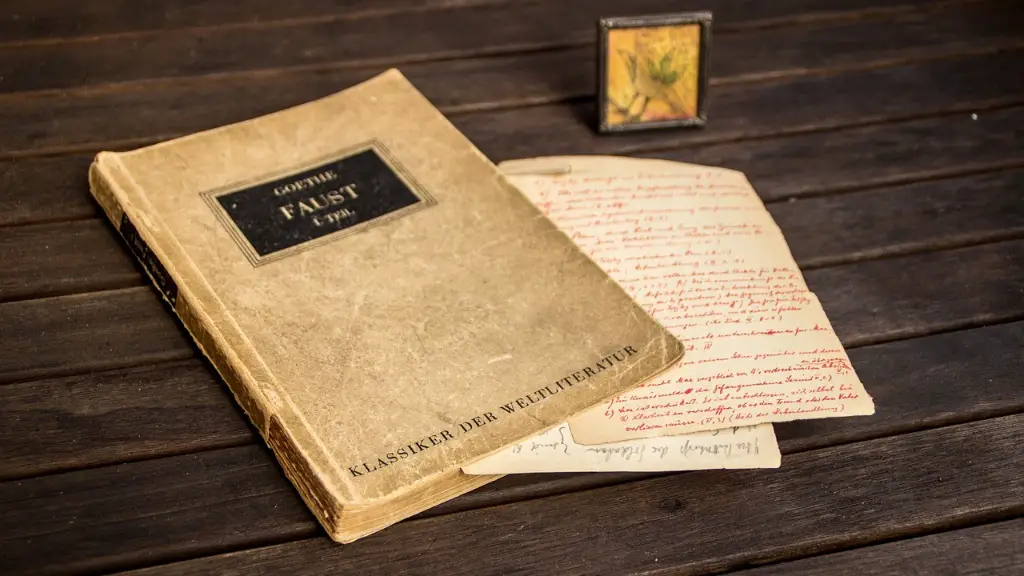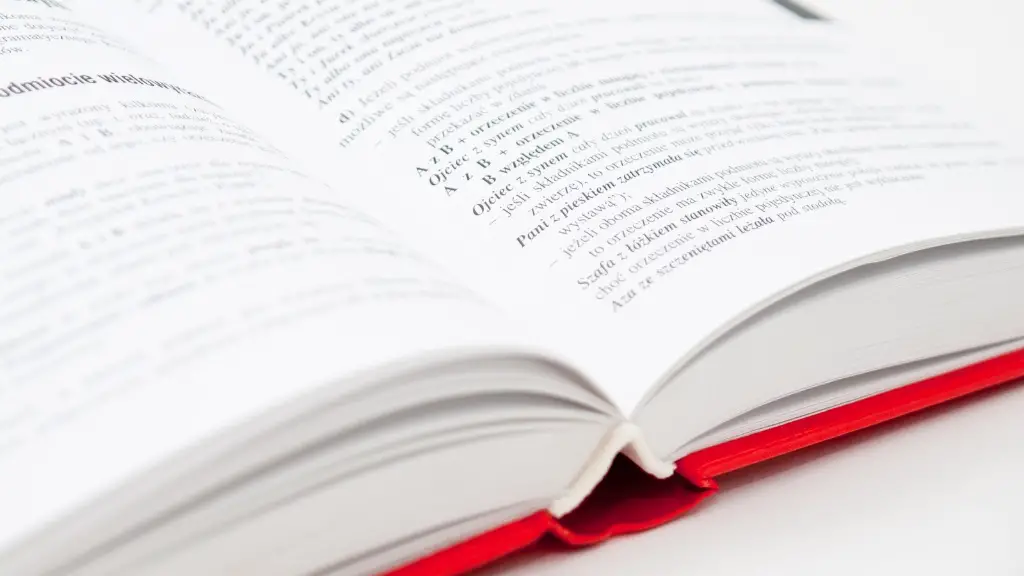Introduction to Poetry and its Historical Significance
Poetry has been used in countless cultures since the beginning of time to express emotion, tell stories, and record history.Believed to have been the oldest form of literature, it is still widely recognised today.Poetry has played a key role in organising thoughts, understanding cultures, and communicating with others throughout history.
In the days of ancient texts and manuscripts, poetry was a way to record and document the stories of an era that would have otherwise been forgotten. Ancient Chinese, Greek, and Viking poems often remained relevant for centuries and provided a window into the literature, beliefs and customs of those times.
It is thought that many of the first stories ever written were told in poetic form.Even though the original meaning and words were lost in translation over time, their stories could still be understood. Ancient poetic works were often created for a specific audience, enabling written works to remain relevant for years to come.
Poetry has always been a reflection of a culture’s values, beliefs, and attitudes. Through the course of history, poetry has been used to document powerful messages, capture transformational moments, and reveal emotional content. It has been used to express anger, joy, pain and suffering in a way no other form of writing could.
Therefore, poetry has the power to leave a lasting impression and make an impact on those who read it. It can be inspiring and moving, capturing a unique moment in time and conveying it in a way that can be understood and remembered for generations.
Poetry in Politics and Religion
Throughout history, poetry has been used to discuss and debate political ideologies as well as religious beliefs. It has been used as a form of protest, an outlet to express emotions, or as a way to simply firmly state one’s opinion. Many of the infamous wars and battles have been immortalised in poetry.Poets have often been recognised as political activists and even as revolutionaries.
Equally, poetry has played an important role in the discussion and development of religious beliefs. In Judaism, the Tanakh (the original Hebrew Bible) is mainly written in poetic form.In Christianity, poets like Dante and Milton have used their works to illustrate and discuss their faith in a creative and emotive manner.The same can be said of Islamic literature, with poets like Rumi and Khayyam penning words that are still relevant centuries later.
More recently, modern poets like Langston Hughes, Maya Angelou and A.E. Housman have used poetry to convey social and political messages. Their words can often resonate with a large audience and leave a lasting impact on all of their readers.
How Poetry Interprets History
Poetry is an art form that is able to encapsulate a time in history. Poets often find new, creative ways to express their thoughts and feelings about a particular event or period, and embed them in their poetry. This gives us, as readers, an insight into the thoughts and opinions of those times that could otherwise be lost.
It can also be used to draw connections between different cultures, as some poets use history as a base on which they later build. By using elements of history, they can make connections between cultures and even bridge the divide between different faiths. Such poems can help us to see the similarities betweens cultures rather than the differences that often separate them.
A prime example of a poem that interprets history is Wilfred Owen’s ‘Dulce et Decorum Est’. His poem was able to capture the horror experienced by soldiers in the trenches of World War One, as if Owen was able to take us back and bear witness to those horrors in all their gruesome detail.This poem is crucial in helping us understand and interpret the history of the war, and it even gave rise to the antiwar movement we now see in the 21st century.
The Role of Poetry in Education
For centuries, poetry has been used as an educational tool, imparting knowledge and opening up new pathways of thought.Many of the most famous poets throughout history also happen to be teachers, like Dante Alighieri, who wrote The Divine Comedy, and Confucius, who wrote The Analects. This duality of knowledge – they saw an opportunity to teach through the use of their writing.It is thought that some of the earliest schools were set up to teach poetry.
In the present day, the traditional classroom setting has changed, but poetry still retains a significant role in education. In many schools, poetry plays a vital role in the development and understanding of language. It can help to increase reading and writing abilities, as poetry teaches students to break down words and phrases into their smallest components, and thus be able to interpret what is written.
To this day, the importance of poetry in education continues to be widespread. From early learning through to college education, poetry can be used as an effective method of teaching. Poetry can provide a key to unlock things that are otherwise hard to understand, and it can widen one’s vision of our history, our culture, and our world.
The rich Variety of Poetic Forms
Poetry is a rich and versatile art form. From sonnets and odes to haikus and acrostics, there is a vast array of poetic forms available. Each form has its own unique characteristics and challenges, enabling poets to express themselves on a variety of topics.
Take the sonnet form, for example. It is a form of poetry that dates back to the days of the Renaissance, when poets like Petrarch and Shakespeare popularised it. A sonnet is a short poem consisting of fourteen lines, and is composed in a strict pattern of rhyme and meter. Its purpose is to make a detailed observation on a particular subject that can be distilled into a single coherent thought.
Haiku poetry is another form of poetry which originates from Japan. It is composed of three lines of five, seven, then five syllables. A haiku seeks to capture a moment in time and distil it into a few lines in a way that conveys the deepest of emotions that one feels from that moment.
These forms and more are used to reinvigorate the writing of poetry and make it relevant to modern life. By challenging what can be expressed through the use of poetry, poets create new forms of expression that can help to define their culture and their world
How Poetry Bolsters Morality
Poetry is an effective tool for connecting with people on a deep emotional level. By expressing feelings through words, poets allow us to confront and talk about sensitive topics.They also give us the language to express ourselves and engage in meaningful conversations with others.
One way poets have been able to challenge morality is through their use of symbolism. Poets often use symbolism to delve deeper into their topic and explore a variety of emotions. Symbols such as birds, trees, or nature can be powerfully used to demonstrate a point or moral lesson. This technique has been used throughout history to provide an insight into the values of various cultures and to shape our understanding of right or wrong.
Similarly, metaphors can also be used to discuss emotions in a much more powerful way. By comparing two abstract entities, poets can elicit deep thoughts and feelings that are beyond our understanding. Poetry can help to broaden our perception of the world, build empathy and compassion, and challenge our assumptions about what is right and wrong.
The Impact of Poetry on Society
By giving us a window into the thoughts and feelings of different people, poetry can inspire us to think more deeply about a certain issue or question, enabling us to gain a different perspective. Where a conversation might be too heated to reach a conclusion, poetry can provide calm and reflective moments of reflection.
Poetry often provides a much-needed respite to people facing difficult situations. It can be a form of self-expression and therapy, allowing us to tap into the words of another who has faced the same adversity and is able to express their emotions through poetry.
Moreover, poetry can provide us with comfort and solace in times of difficulty. In times of loss, it can offer words of solace that words simply cannot. Poetry can be used as a vehicle to share thoughts and feelings which would otherwise be too hard to express, and that is why it has the power to resonate with and have an immediate impact on people of all ages.
How Poetry evokes… and preserves Memories
Memory is often selective, and it is hard to capture the full details of a particular moment or experience. Poetry can be used to revisit and record these moments, breaking them down into verses and allowing us to revisit our memories every time we read them.It can be used to preserve memories and relive the details, offering a narrative that is far richer than any single photograph or record ever could.
Poetry has the power to evoke the deepest and strongest of emotions.It can provide us with the language to express ourselves on topics we find too painful to discuss in normal conversation, and by reading and understanding other people’s poems, we can gain a better understanding of how to express our own feelings.
Therefore, poetry has been an important form of communication for centuries, helping us to make sense of the past, interpret the present, and understand our place in the world. By providing us with the language to express our feelings, memories, and understandings, it can be clearly seen just why poetry is so important to history.





